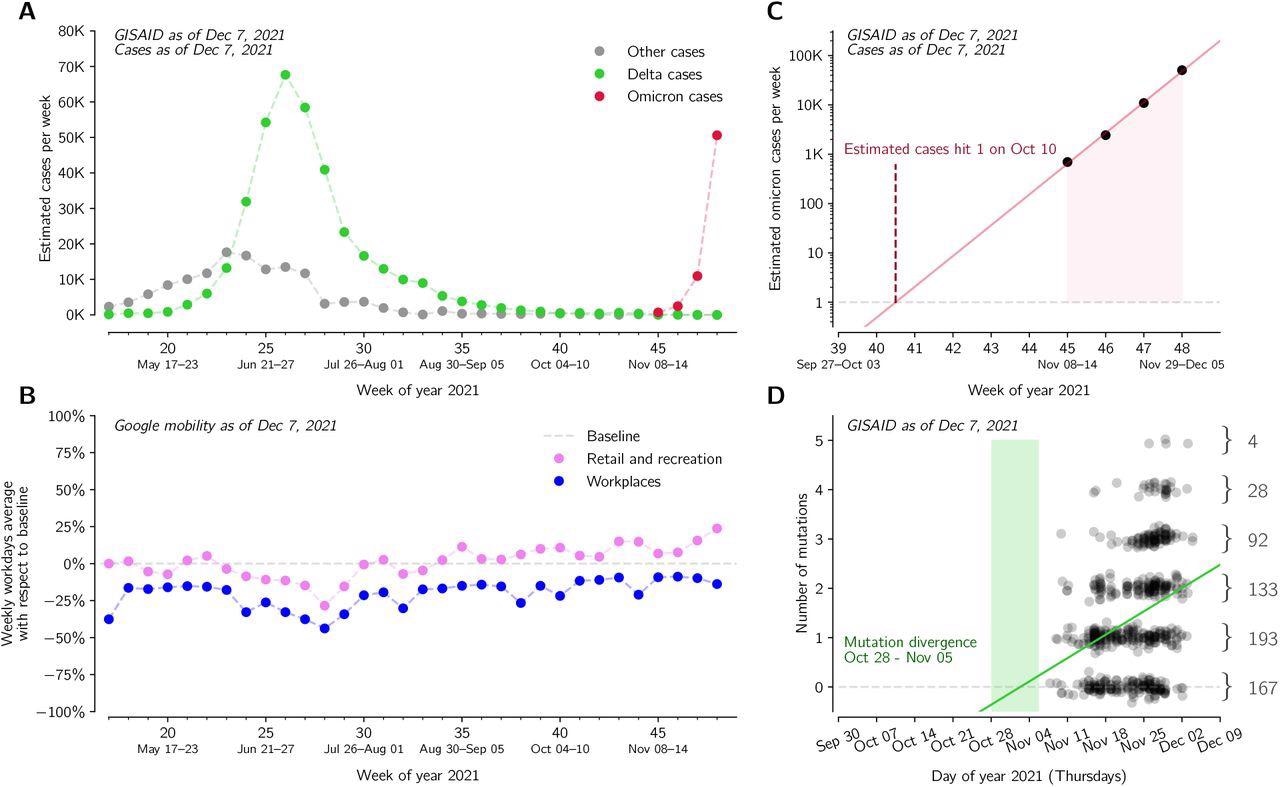The evolution of severe acute respiratory syndrome coronavirus-2 (SARS-CoV-2) has led to the emergence of many variants. Some of the variants have been reported to be more virulent and have a higher rate of transmission compared to the original SARS-CoV-2 strain that emerged in Wuhan, China, in 2019. These variants have been classified as variants of concern (VoC) and variants of interest (VoI). Some VoCs, such as the Delta variant, can evade the immune response generated via natural infection or coronavirus disease 2019 (COVID-19) vaccination.
 Study: Omicron strain spreads with the doubling time of 3.2—3.6 days in South Africa province of Gauteng that achieved herd immunity to Delta variant. Image Credit: Shutterstock
Study: Omicron strain spreads with the doubling time of 3.2—3.6 days in South Africa province of Gauteng that achieved herd immunity to Delta variant. Image Credit: Shutterstock

 This news article was a review of a preliminary scientific report that had not undergone peer-review at the time of publication. Since its initial publication, the scientific report has now been peer reviewed and accepted for publication in a Scientific Journal. Links to the preliminary and peer-reviewed reports are available in the Sources section at the bottom of this article. View Sources
This news article was a review of a preliminary scientific report that had not undergone peer-review at the time of publication. Since its initial publication, the scientific report has now been peer reviewed and accepted for publication in a Scientific Journal. Links to the preliminary and peer-reviewed reports are available in the Sources section at the bottom of this article. View Sources
Background
Recently, a new VoC has emerged, known as Omicron. It belongs to the Pango lineage B.1.1.529. This variant was first reported in the Gauteng province of South Africa in November 2021. Scientists have characterized Omicron and found the presence of thirty amino acid substitutions, three small deletions, and one small insertion in the spike protein region of the genome. Thereby, this VoC contains fifty-one amino‐acid mutations and, according to the Omicron phylogenetic tree, accessed from Nextstrain, the closest known epigenetic sister contains fifteen mutations with only nine mutations in common. This result had indicated a distance of forty-two mutations from the last common ancestor.
On the basis of the phylogenetic tree and collection date of the Omicron epigenetic sister, i.e., in September 2020, scientists suggested that more than a year of evolution in an isolated niche has been associated with this emergence. Mostly, the mutations took place in an immunocompromised host. However, more data are required to nullify other possibilities such as the existence of hidden branches.
A New Study
Studies have shown that Omicron started spreading rapidly in Gauteng province and caused an abrupt epidemic outbreak in the province.
A new study, published on the medRxiv* preprint server, estimates the Omicron variant’s doubling time and the divergence date based on the data obtained from the GISAID.
Scientists have shown the exponential growth of the Omicron strain found in Gauteng. They reported the doubling time of this strain to be equal to 3.38 days by analyzing its growth from November 8 to December 5, 2021. Based on the mutation accumulation profile, researchers revealed that this strain began to diverge between October 28 and November 5, 2021.
 Growth and divergence of the Omicron strain. A Weekly aggregated cases of Omicron, Delta, and other variants in the Gauteng province in South Africa. B Weekly averaged mobility in workdays in the Gauteng province in workplaces and retail & recreation centers. C Exponential growth of the Omicron strain in weeks 45–48, 2021 (November 8–December 5) in the Gauteng province. D Accumulation of mutations on the Omicron strain worldwide based on Nextstrain phylogenetic tree. The green line shows the mutation accumulation trend determined by the linear regression assuming the Poisson distribution of the number of mutations in a given time. The 95% credible interval is shown by the light green rectangle.
Growth and divergence of the Omicron strain. A Weekly aggregated cases of Omicron, Delta, and other variants in the Gauteng province in South Africa. B Weekly averaged mobility in workdays in the Gauteng province in workplaces and retail & recreation centers. C Exponential growth of the Omicron strain in weeks 45–48, 2021 (November 8–December 5) in the Gauteng province. D Accumulation of mutations on the Omicron strain worldwide based on Nextstrain phylogenetic tree. The green line shows the mutation accumulation trend determined by the linear regression assuming the Poisson distribution of the number of mutations in a given time. The 95% credible interval is shown by the light green rectangle.
A sharp surge in COVID-19 cases occurred due to the super spreading event at the beginning of November, before the more regular exponential growth started. Researches predicted the divergence date to be between October 28 and November 5, 2021, as Omicron genomes were not detected prior to November 8. This finding implies that Omicron circulating from October or September 2021 is unlikely.
The Delta variant had been the dominant circulating strain in Gauteng before the outbreak of the Omicron occurred. Before Omicron, the COVID-19 epidemic was receding without implementation of any restrictions in mobility, implying that the population of Gauteng attained herd immunity to the Delta variant. According to the current data, the Omicron variant has possibly overcome the population-level immunity.
The current study showed that the doubling time of Omicron is between 3.18–3.61 days for the Gauteng province, which is greater than but comparable to that of the first COVID‐19 strain outbreaks in spring 2020 (between 1.86 and 2.88) for China, France, Italy, Spain, Germany, UK, Switzerland, and New York State.
Implications of this Study
One of the recent studies has indicated that owing to significant RBD mutations, Omicron can evade the neutralizing antibodies. The rapid transmission of this variant has significantly increased the hazard ratio for reinfection versus primary infection. The short Omicron doubling time suggests a high possibility of replacing the Delta variant and becoming the dominant strain. Therefore, Omicron can cause epidemic outbreaks across the world. These outbreaks would be extremely difficult to control owing to breakthrough infections as well as increasing lockdown fatigue.

 This news article was a review of a preliminary scientific report that had not undergone peer-review at the time of publication. Since its initial publication, the scientific report has now been peer reviewed and accepted for publication in a Scientific Journal. Links to the preliminary and peer-reviewed reports are available in the Sources section at the bottom of this article. View Sources
This news article was a review of a preliminary scientific report that had not undergone peer-review at the time of publication. Since its initial publication, the scientific report has now been peer reviewed and accepted for publication in a Scientific Journal. Links to the preliminary and peer-reviewed reports are available in the Sources section at the bottom of this article. View Sources